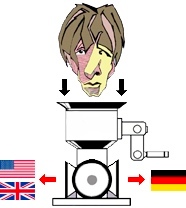Which of these translation fields is more 'AI-proof' in your view: medical, technical or sworn? Thread poster: Joanna Florkowska
|
|---|
My personal guess falls somewhere between sworn and medical, but I am not speaking from the position of someone who has had hands-on experience in these fields. I would be happy to pick the brains of those of you who do!
As for sworn translation, authorities in most countries are somewhat slow to adapt new technologies, not least because of the huge costs involved in a potential overhaul incorporating AI. Moreover, a sworn translator acts as a notary in a way, which gives them addit... See more My personal guess falls somewhere between sworn and medical, but I am not speaking from the position of someone who has had hands-on experience in these fields. I would be happy to pick the brains of those of you who do!
As for sworn translation, authorities in most countries are somewhat slow to adapt new technologies, not least because of the huge costs involved in a potential overhaul incorporating AI. Moreover, a sworn translator acts as a notary in a way, which gives them additional authority for negotiation. However, some legal documents are indeed quite repetitive, so there could be some possible application of AI in a distant future within this particular sector.
Arguments for medical translation: there would be simply too much at stake to leave it in the hands of AI to any degree (correct me though if it's already happening on a noticeable scale). Medical content can be repetitive, but much less so as in the case of certain legal documents, and, arguably, with way more serious repercussions in case of something going awry. And AI still does hallucinate and invent random terms, so postediting, which is less intuitive and quite cumbersome, would possibly be a questionable choice for many customers. Just one case gone wrong as a precedent would probably broadly resonate in the media and be enough to keep the best medical translators in high demand despite AI advancement. ▲ Collapse
| | | |
Sworn, for a while, because it is archaic to begin with.
Nothing is safe, especially factual texts.
| | | | Joakim Braun 
Sweden
Local time: 17:17
German to Swedish
+ ...
But really all fields where the translation is a microscopic part of total costs, and/or where a misunderstood term/homograph can cost lives and lead to gigantic lawsuits.
Also sworn has lots of private one-off customers who don't give a damn about AI or margins, they just want to submit their filing to the court and be done. No one is that interested in saving money - not the courts, not the authorities and not (on the whole) the customers.
Even at the point where AI i... See more But really all fields where the translation is a microscopic part of total costs, and/or where a misunderstood term/homograph can cost lives and lead to gigantic lawsuits.
Also sworn has lots of private one-off customers who don't give a damn about AI or margins, they just want to submit their filing to the court and be done. No one is that interested in saving money - not the courts, not the authorities and not (on the whole) the customers.
Even at the point where AI is on average generating better text than the average translator (we'll get there quite soon), 99% isn't good enough for sworn, medical and some technical work. The texts themselves could be quite suitable for AI (predictable, repetitive, unambiguous, with recurring vocabulary etc).
But even in fields where customers actively avoid AI automation, lots of translators will work with AI on their own, pretend they don't and lower their rates...
[Bearbeitet am 2023-05-05 20:50 GMT] ▲ Collapse
| | | | Michele Fauble 
United States
Local time: 08:17
Member (2006)
Norwegian to English
+ ...
| Medical errors | May 5, 2023 |
Joanna Florkowska wrote:
Just one case gone wrong as a precedent would probably broadly resonate in the media and be enough to keep the best medical translators in high demand despite AI advancement.
“Medical errors are the third-leading cause of death after heart disease and cancer.”
https://www.cnbc.com/2018/02/22/medical-errors-third-leading-cause-of-death-in-america.html
Would AI be held to a higher standard than doctors, nurses and other health care professionals? Or just be considered another unavoidable source of medical errors?
[Edited at 2023-05-05 22:05 GMT]
| | |
|
|
|
Tom in London
United Kingdom
Local time: 16:17
Member (2008)
Italian to English
Academic texts written intentionally to be unfathomable by university professors who protect their careers by being obscurantist. In such cases, the task of the translator is to make comprehensible that which is not intended to be comprehensible. I have just spent a entire day on one paragraph of a text of that kind. And I'm still not satifisfied with it. I'm worried that it might be too easy to understand.
AI could not do what I've been doing. AI doesn't understand committment.<... See more Academic texts written intentionally to be unfathomable by university professors who protect their careers by being obscurantist. In such cases, the task of the translator is to make comprehensible that which is not intended to be comprehensible. I have just spent a entire day on one paragraph of a text of that kind. And I'm still not satifisfied with it. I'm worried that it might be too easy to understand.
AI could not do what I've been doing. AI doesn't understand committment.
[Edited at 2023-05-06 10:02 GMT] ▲ Collapse
| | | | | Legal & AI = Sworn enemies | May 6, 2023 |
Artificial Intelligence (Artificial Imbecility some say, including me...) is the sworn enemy of legal translations as well as legal translators - at least in my language pair (EN-FR). Even more than that: they are two irreconciliable enemies.
The main reason to that comes from the fact that legal phrasing style represent a weird challenge for any Artificial Imbecility, because legal terminology is a foreign language in itself within the foreign language per se. Writing this, I mean ... See more Artificial Intelligence (Artificial Imbecility some say, including me...) is the sworn enemy of legal translations as well as legal translators - at least in my language pair (EN-FR). Even more than that: they are two irreconciliable enemies.
The main reason to that comes from the fact that legal phrasing style represent a weird challenge for any Artificial Imbecility, because legal terminology is a foreign language in itself within the foreign language per se. Writing this, I mean it is a totally different language than your mother tongue, at such extent that native ordinary French people are unable to understand, let alone to decipher, the grounds and the very meaning of judgements returned by French courts.
Such legal intricacies and nuances between seemingly similar terms but having quite different meaning (and therefore different consequences) are definitively beyond control and understanding of any so-called Artificial Intelligence. Hence the nickname "Artificial Imbecility".
The first difference between a human legal translator and AI is that AI will be somehow translating whatever document it doesn't understand, whereas the translator will be first understanding the document before translating it.
The second one is that a human translator, especially a certified legal translator, is duly assured most of the time by a professional insurance policy to guarantee any professional misconduct or malpractice towards any client or authority. Such a subscription is even a mandatory requirement in France for any sworn expert court translator. By contrast, Artificial Imbecility has not to bear with such a strigent burden to make it run like a charm and with complete impunity... ▲ Collapse
| | | | Tom in London
United Kingdom
Local time: 16:17
Member (2008)
Italian to English
Laurent Di Raimondo wrote:
.....AI will be somehow translating whatever document it doesn't understand, whereas the translator will be first understanding the document before translating it.
| | | | Jan Truper 
Germany
Local time: 17:17
Member (2016)
English to German
Tom in London wrote:
In such cases, the task of the translator is to make comprehensible that which is not intended to be comprehensible.
I encounter this sort of thing a lot -- I am often not translating what is being said, but what is meant to be said.
[Edited at 2023-05-07 06:37 GMT]
| | |
|
|
|
Tom in London
United Kingdom
Local time: 16:17
Member (2008)
Italian to English
| The real problem in such cases | May 7, 2023 |
Jan Truper wrote: Tom in London wrote:
In such cases, the task of the translator is to make comprehensible that which is not intended to be comprehensible. I encounter this sort of thing a lot -- I am often not translating what is being said, but what is meant to be said. [Edited at 2023-05-07 06:37 GMT]
....is to make sure you have fully understood what it means, and then translate it so that the obscurantism is preserved. I don't think AI would be able to go through that 2-step process (although I could be wrong): first, understanding clearly what the writer does not intend you to understand, and second, translating it so that the writer's intention to be difficult or impossible to understand is faithfully preserved.
What AI can't deal with is the *intention* that lies behind a text. It only sees what it sees.
The same would apply to fiction, where the reader is "invited" (though not explicitly) to see what's going on below the surface of a narrative. This may not ever be said, but is crucially important. As (for example) in the short stories of Richard Ford, where you kind of know why what he's describing is happening. Although he never says it, he makes you think it. I mention Richard Ford off the top of my head but any other (good) author of short stories would do.
[Edited at 2023-05-07 11:20 GMT]
| | | |
Tom in London wrote:
AI could not do what I've been doing. AI doesn't understand committment.
It might do if it was spelled correctly
| | | | There is no moderator assigned specifically to this forum. To report site rules violations or get help, please contact site staff » Which of these translation fields is more 'AI-proof' in your view: medical, technical or sworn? | Anycount & Translation Office 3000 | Translation Office 3000
Translation Office 3000 is an advanced accounting tool for freelance translators and small agencies. TO3000 easily and seamlessly integrates with the business life of professional freelance translators.
More info » |
| | Trados Business Manager Lite | Create customer quotes and invoices from within Trados Studio
Trados Business Manager Lite helps to simplify and speed up some of the daily tasks, such as invoicing and reporting, associated with running your freelance translation business.
More info » |
|
| | | | X Sign in to your ProZ.com account... | | | | | |





















